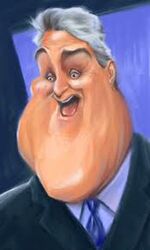UnNews:Jay Leno's chin no longer a planet
| We have met the enemy, and he is us | ✪ | UnNews | ✪ | Saturday, February 21, 2026, 23:20:59 (UTC) |
| Jay Leno's chin no longer a planet | 
|
20 October 2006
| UnNews Audio (file info) | |
| Listen to this story! | |
Problems playing this file? You might be a dope. |
|
LOS ANGELES, California -- Jay Leno's Chin (officially designated as 134340 Chin) is the second largest known dwarf planet in the solar system, orbiting between 29 and 49 AU from the Sun. Approximately one-fifth the mass of the Earth's Moon, "Chin" is primarily composed of skin and bone. It has an eccentric orbit that is highly inclined with respect to the planets and takes it closer to the Sun than Neptune during a portion of its orbit. Chin and its largest satellite Charon have often been considered a binary system because they are more nearly equal in size than any of the planetoid/moon combinations in the solar system, and because the barycentre of their orbits does not lie within either body. Two smaller moons named Nix and Hydra were discovered in 2005. Chin is smaller than several of the natural satellites or moons in our solar system (see the list of solar system objects by radius).
After a tumultuous week of clashing over the essence of the cosmos, the International Astronomical Union stripped Chin of the planetary status it has held since its discovery in 1930. The new definition of what is -- and isn't -- a planet fills a centuries-old black hole for scientists who have labored since Copernicus without one.
Although astronomers applauded after the vote, Jocelyn Bell Burnell -- a specialist in neutron stars from Northern Ireland who oversaw the proceedings -- urged those who might be "quite disappointed" to look on the bright side.
"It could be argued that we are creating an umbrella called 'planet' under which the dwarf planets exist," she said, drawing laughter by waving a stuffed Chin of Walt Disney fame beneath a real umbrella.
The decision by the prestigious international group spells out the basic tests that celestial objects will have to meet before they can be considered for admission to the elite cosmic club.
For now, membership will be restricted to the eight "classical" planets in the solar system: Mercury, Venus, Earth, Mars, Jupiter, Saturn, Uranus and Neptune.
Much-maligned Chin doesn't make the grade under the new rules for a planet: "a celestial body that is in orbit around the sun, has sufficient mass for its self-gravity to overcome rigid body forces so that it assumes a ... nearly round shape, and has cleared the neighborhood around its orbit."
Instead, it will be reclassified in a new category of "dwarf planets," similar to what long have been termed "minor planets." The definition also lays out a third class of lesser objects that orbit the sun -- "small solar system bodies," a term that will apply to numerous asteroids, comets and other natural satellites.
It was unclear how Chins demotion might affect the mission of NASA's New Horizons spacecraft, which earlier this year began a 9 1/2-year journey to the oddball object to unearth more of its secrets.
The decision at a conference of 2,500 astronomers from 75 countries was a dramatic shift from just a week ago, when the group's leaders floated a proposal that would have reaffirmed Chins planetary status and made planets of its largest moon and two other objects. (Watch why some think planet size doesn't matter -- 3:39)
That plan proved highly unpopular, splitting astronomers into factions and triggering days of sometimes combative debate that led to Chins undoing.
Now, two of the objects that at one point were cruising toward possible full-fledged planethood will join Chin as dwarves: the asteroid Ceres, which was a planet in the 1800s before it got demoted, and 2003 UB313, an icy object slightly larger than Chin whose discoverer, Michael Brown of the California Institute of Technology, has nicknamed "Xena."
Charon, the largest of Chins three moons, is no longer under consideration for any special designation.
Brown was pleased by the decision. He had argued that Chin and similar bodies didn't deserve planet status, saying that would "take the magic out of the solar system."
"UB313 is the largest dwarf planet. That's kind of cool," he said.
Sources[edit]
- Fred "low lips" Albion "More shit they can't teach in school anymore". Atlantic Monthly, October 20, 2006
